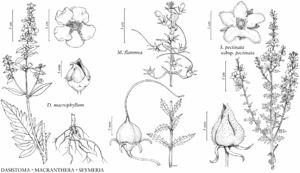Dasistoma macrophyllum
New Fl. 2: 67. 1837.
Stems branched distally, rarely unbranched, square to round, 80–200 cm. Leaves: basal and cauline: petiole (5–)15–100 mm; blade ovate to ovate-lanceolate, 15–35 x 6–22 cm, segment margins irregularly serrate to irregularly dentate, surfaces scabrid-puberulent to pubescent; distal: petiole 2–20(–35) mm; blade lanceolate to narrowly lanceolate, 7–21 x 2–14 cm, segment margins entire or crenate, irregularly serrate, or irregularly dentate, surfaces scabrid-puberulent to pubescent. Racemes 1–8, congested to interrupted, cylindric, 7–35 cm; bracts leafy, gradually smaller distally, 9–65 x 7–35 mm, margins entire or irregularly serrate to irregularly dentate, apex acute; cymes 1-flowered. Pedicels erect, 1–4 mm, puberulent to retrorsely puberulent. Flowers: calyx puberulent to pubescent, lobes (2–)4–5.5 x 2.5–4.5 mm, margins entire, apex acute to obtuse, membranous; corolla 15–16 mm, glabrous externally, densely lanate internally; tube 7–9 mm; throat inflated, 5–7 mm diam.; lobes spreading, ovate-reniform, 6–7 mm; stamens distinct, reaching orifice or barely exserted, pollen sacs 2–2.8 mm. Capsules ovoid to globular-ovoid, 8–12 x 7–9 mm, glabrous. Seeds reticulate, 1.8–2.5 x 1–2 mm.
Phenology: Flowering Jun–Sep.
Habitat: Dry to mesic forests and woodlands, brushy tallgrass prairies, stream banks.
Elevation: 60–400 m.
Distribution
Ala., Ark., Ga., Ill., Ind., Iowa, Kans., Ky., La., Mich., Miss., Mo., Nebr., Ohio, Okla., Pa., S.C., Tenn., Tex., Va., W.Va., Wis.
Discussion
In the greenhouse, Dasistoma macrophyllum formed haustorial connections with 18 species of gymnosperm and angiosperm trees, but it also could remain autotrophic (L. J. Musselman and W. F. Mann 1979); there is no evidence of autotrophy in the wild.
Selected References
None.
